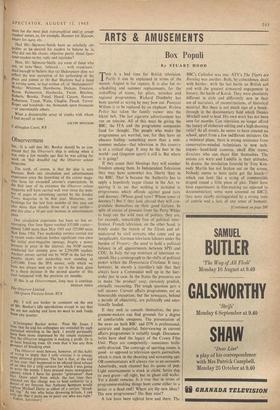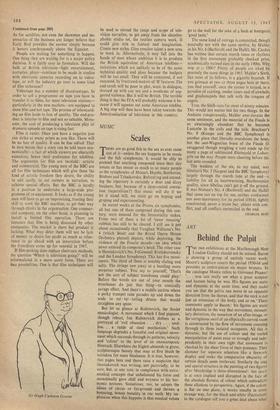ARTS & AMUSEMENTS
Box Populi
By STUART HOOD pins is a bad time for British television.
Partly it can be explained in terms of the season. August is for repeats. It is also for re- scheduling and summer replacements, for the reshuffling of teams, for pilots, mistakes and regional programmes. Richard Dimbleby has been quoted as saying he may bow out. Pussycat Willum is to be replaced by an elephant. Riviera Police has taken the family viewer into the bikini belt. The last cigarette advertisenient has run on telecine. All of this must be giving the BBC, the ITA and the programme companies food for thought. The people who make the programmes are worried, too; for they have an obscure feeling—something more than a mid- summer malaise—that television in this country is at a critical stage. It may be the best in the world—and (jingoism apart) it still is. But where is it going?
If they count their blessings they will number freedom among them. In Independent Television they may have somewhat less liberty than in the BBC. That is because the Authority has to apply a hopelessly vague clause in the Act, re- quiring it to see that nothing is included in programmes which offends against good taste and decency. (Whose good taste? Whose sense of decency?) But if they look abroad they will con- gratulate themselves on their good fortune. In spite of stories of pressure from the Party Whips to keep out the wild men of politics, they are, for example, remarkably free of political inter- ference. French television, on the other hand, is firmly under the thumb of the Elysde and ad- ministered by civil servants who come and go inexplicably. German television labours under the burden of Proporz—the need to hold a political balance in all appointments between SPD and CDU. In Italy the top structure of television re- sponds like a seismograph to the shifts of political power within the Deniocrazia Cristiana. It may, however, be merely a traveller's tale that they always have a Communist well up in the hier- archy just in case. In the States the pressures are to make 'the product' cosy, curiously prudish, eternally reassuring. The tough question gets a soft answer. Current affairs programmes are an honourable exception; but the newscasts, behind a parade of objectivity, are politically and emo- tionally loaded.
If they seek to console themselves, the pro- gramme-makers can find grounds for a degree of comfortable smugness. •The presentation of the news on both BBC and ITN is professional, accurate and impartial. Interviewing in current affairs programmes is suitably tough. Documen- taries have shed the legacy of the Crown Film Unit. Plays are competently—sometimes brilli- antly-directed. The coverage of sporting events is good- -as opposed to television sports journalism, which is stuck in the shouting and screaming age. OB commentators will always rise to an occasion. Admittedly, each channel has its quota of pap. Light entertainment is stuck in clich6. Satire dug its own grave —all right, but its ghost still walks. Yet a doubt remains. Is it true that in terms of programme-making things have come either to a pause or a dead end? Where are the new. ideas? The new programmes? Do they. exist?
A few have been sighted here and there. The
BBC's Culloden was one. ATV's The Tigers are Burning was another. Both, by.coincidence, dealt with battles: with the last battle on British soil and with the greatest armoured engagement in history, the battle of Kursk. They were absolutely different in style and differently new in their use of narrators, of reconstructions, of historical material. But there is not much sign of a break- through in the documentary field which Dennis Mitchell used to lead. His own work has not been seen for months. Can television no longer afford the luxury of elaborate editing and a high shooting ratio? At all events, he seems to have created no school, apart from a few indifferent imitators. On a technical plane, there is strong resistance from conservative-minded technicians to new tech- niques--hand-held cameras, small film teams, directors who can shoot film themselves. The unions are wary and Luddite in their attitudes. In drania, the revolution foretold by Troy Ken- nedy Martin has not broken out on the screen. Nobody seems to have quite got the knack— which can look like a string of commercials draped round a little piece of plot. There have been experiments in film-making (as opposed to documentaries); some were screened on BBC2; they were chiefly distinguished by a strong taste of coterie and a lack of any sense of humour.
[Continued on page 208
Continued from page 2051 As for satellites, not even the showmen and im- presarios of the business any longer believe that Early Bird provides the answer simply because it hovers synchronously above the Equator.
People are waiting for something to happen. One thing they are waiting for is a major policy decision. It is fairly easy to formulate. Will the bulk of British television—light entertainment, narrative, plays—continue to be made in studios with electronic cameras recording on to video- tape, or will the industry go over to some kind of film technique?
Videotape has a number of disadvantages. In order to sell a programme on tape you have to transfer it to films, for most television stations— particularly in the new markets—are equipped to show film and not tape. The process of telerecord- ing on film leads to loss of quality. The end-pro- duct is inferior to film and not so saleable. More- over, the cost of producing a television play or dramatic episode on tape is rising fast.
Film is easier. Once you have a negative you can strike as many prints as you like. There will be no loss of quality. It can be fine edited. That in turn means that a story can be told more eco- nomically—a fact of which viewers are obscurely conscious, hence their preference for telefilms. The arguments for film are twofold: artistic and commercial. The young men of the BBC are all for film techniques which will give them the kind of artistic freedom they desire, the ability to edit easily, to cut corners in narration, to achieve special effects.. But the BBC is hardly in a position to undertake a large-scale pro: gramme of re-equipment. It looks as if the young men will have to go on improvising, trusting their skill to work the BBC machine, to get their way through chinks in the organisation. One commer- cial company, on the other hand, is planning to install a limited film operation. There are rumours that film is being discussed by other companies. The market is there but product is lacking. What may deter them will not be lack of money or desire for profit so much as reluc- tance to go ahead with an innovation before the franchises. come up for renewal in 1967.
If film-making does replace electronic methods, the question 'Where is television going?' will be reformulated in a more acute form. There are two possibilities. One is that film techniques will Sir Hugh Carleton Greene
be used to extend the range and scope of tele- vision narrative, to get away from the claustro- phobic studio set, the routine camera work. It could give rein to fantasy and imagination. Create new styles. Give creative talent a new area to work in. Alternatively, it may fall into the hands of men whose ambition it is to produce the British equivalent of American telefilms- imitations which are unlikely to be of the same technicaL quality and gloss because the budgets will be too small. They will be conceived, if not executed, by frustrated makers of 'B' features. The end-result will be poor in plot, weak in dialogue, dressed up with coy sex and a modicum of sug- gested violence. But it will be British. The terrible thing is that the ITA will probably welcome it be- cause it will squeeze out some American telefilm. A big step will then have been taken towards the Americanisation of television in this country.































 Previous page
Previous page